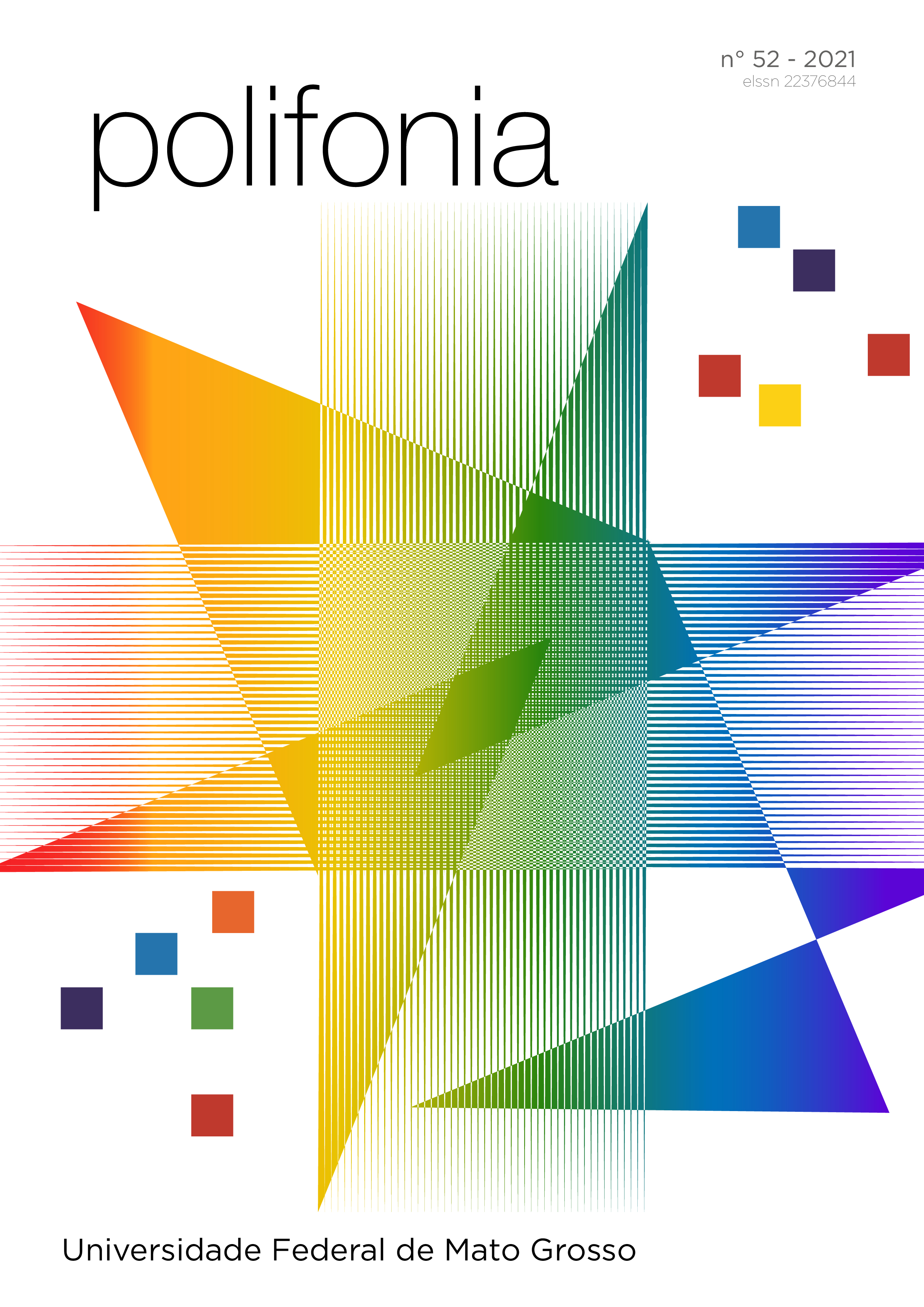The care of/for others
COVID-19 pandemics in minority Brazilian communities
Resumo
In this paper, the relationship body, knowledge, and social practices within a decolonial perspective is addressed through a study on discourses of care and caring in the global COVID-19 syndemic by communities representing three vulnerable groups in Brazil - the Indigenous peoples, the Quilombolas, and the Landless Rural Workers Movement. These groups have been severely affected by the disease as national containment policies have failed to respond to their specific needs and disregarded their philosophies and practices of care. Our corpus comprises images, videos, and written materials produced by members of these communities and by government authorities on the matter of COVID-19. They were gathered from social media and websites under the thematic, qualitative enunciative criteria “COVID-19 + minority groups in Brazil”. A transcultural and discursive analysis of the data was performed to answer the following research questions: How have these communities resisted the necropolitics of the Brazilian government in the syndemic? How is care being discursivized by them? Our results point to a concept of care that is always collective, from which it is impossible to think of a form of human existence that could be only individual. Such concept materializes a non-Eurocentric, non-capitalist form of intelligibility on living collectively and caring, a view in which to live means to care and for a dignified existence.
Referências
ABRASCO. Carta da Associação Brasileira de Saúde Coletiva sobre a informação raça/cor nos sistemas de informação de saúde, 2020. Available at: www.abrasco.org.br/site/noticias/posicionamentos-oficiais-abrasco/carta-ao-ministerio-da-saude-sobre-a-informacao-raca-cor-nos-sistemas-de-informacao-da-covid-19/47320/.
ACOSTA, A. (2016) O bem viver: uma oportunidade para imaginar outros mundos. Tradução: Tadeu Breda. São Paulo: Autonomia Literária, Elefante, 2016.
ALMEIDA, S. L. Racismo estrutural. São Paulo: Sueli Carneiro; Pólen, 2019.
BENUCCI, T. MAGRI; JABRA, D. S. Going out into the forest: Yanomami strategy against COVID-19. Cadernos de Campo. 29 (Suppl.), p.26-33, 2020.
BRASIL. Decreto nº 4.887, de 20 de novembro de 2003. Available at: www.planalto.gov.br/ccivil_03/decreto/2003/d4887.htm.
CALDART, R. Pedagogia do Movimento Sem Terra. Petrópolis: Vozes, 2000.
DALOSTO, C. D. Políticas Públicas e os Direitos Quilombolas no Brasil: O exemplo Kalunga. Rio de Janeiro: Lumen Juris, Coleção Direito Agrário PPGDA-UFG, 2016.
FIGUEIREDO, A. M.; FIGUEIREDO, D. C. M.M.; GOMES, L. B.; MASSUDA, A.; GIL-GARCÍA, E.; VIANNA, R. P. T.; DAPONTE, A. Social determinants of health and COVID-19 infection in Brazil: an analysis of the pandemic. Revista Brasileira de Enfermagem, 73(Suppl. 2):1-7, 2020.
GARCIA, M. A.; HOMAN, P. A.; GARCÍA, C.; BROWN, T. H. The Color of COVID-19: Structural Racism and the Disproportionate Impact of the Pandemic on Older Black and Latinx Adults. J. Gerontol B Psychol Sci Soc Sci, 20, (XX), 1–6, 2020.
GROSFOGUEL, R. La descolonización de la economía y los estudios postcoloniales: Transmodernidad, pensamiento fronterizo y colonialidad global. Tabula Rasa, v.xx (4): 17- 48, 2006.
HORTON, R. COVID-19 is not a pandemic. The Lancet. 396: 874, 2020.
JASPER, J. Protesto: uma introdução aos movimentos sociais. Rio de Janeiro: Zahar, 2016.
KOPENAWA, D.; ALBERT, B. A queda do céu: palavras de um xamã yanomami. São Paulo: Companhia das Letras, 2015.
KRENAK, A. A vida não é útil. São Paulo: Companhia das Letras, 2020.
KRENAK, A. Ailton Krenak. In: S. Cohn & I. Kadiwéu (Eds.) Tembetá: conversas com pensadores indígenas. Rio de Janeiro, Azougue Editorial, 2019, pp. 11-51.
LAGE, A. C. A pedagogia que emerge da luta política do MST. Rev. de Edu. Pública, 17(35): 478-508, 2008.
MALDONADO-TORRES, N. Sobre la colonialidad del ser: contribuciones al desarrollo de un concepto. In: CASTRO-GÓMEZ, S.; GROSFOGUEL, R. (Orgs.). El giro decolonial: reflexiones para una diversidad epistémica más allá del capitalismo global. Bogotá: Siglo del Hombre, 2007, pp 127-167.
MARIANO, A. Pedagogia da resistência e o projeto educativo do MST. In: Cássio F. (Org.), Educação contra a barbárie: por escolas democráticas e pela liberdade do ensinar. São Paulo: Boitempo, 2019, pp 175-180.
MBEMBE, A. Necropolítica. São Paulo: n-1 edições, 2018.
NUNES, J. A pandemia de COVID-19: securitização, crise neoliberal e a vulnerabilização global. Cad. Saúde Pública 36(4): 1- 4, 2020.
OLIVEIRA, R. G.; CUNHA, A. P.; GADELHA, A. G. S.; CARPIO, C. G.; OLIVEIRA, R. B. Racial inequalities and death on the horizon: COVID-19 and structural racism. Cad. Saúde Pública, 36(9): p. 1-14, 2020.
RESTREPO, E.; ROJAS, A. Inflexión decolonial: fuentes, conceptos y cuestionamientos. Popayán, Samava, 2010.
RIBEIRO, D. Lugar de fala. Feminismos Plurais. São Paulo: Pólen, 2019.
SANTOS, S. R. Comunidades Quilombolas: as lutas por reconhecimento de direitos na esfera pública brasileira. Tese (doutorado). Programa de Pós-Graduação da Faculdade de Serviço Social, PUCRS, Porto Alegre, 2012. 195 f.
SCHWARCZ, L. Quando acaba o século XX. São Paulo: Companhia das Letras, 2020.
SINGER, M. A dose of drugs, a touch of violence, a case of AIDS: conceptualizing the SAVA syndemic. Free Inquiry in Creative Sociology, 24(2): 99 –110, 1996.
SINGER, M. A dose of drugs, a touch of violence, a case of AIDS, part 2: further conceptualizing the SAVA syndemic. Free Inquiry in Creative Sociology, 34(1): 39–53, 2006.
SINGER, M; CLAIR, S. Syndemics and public health: reconceptualizing disease in bio-social context. Medical Anthropology Quarterly, 17(4): 423– 441, 2003.
SPIVAK, G. C. Pode o subalterno falar? Belo Horizonte: UFMG, 2010.
SOUSA SANTOS, B. A cruel pedagogia do vírus. Coimbra: Almedina, 2020.
SOUSA SANTOS, B. Para além do pensamento abissal: das linhas globais a uma ecologia de saberes. In: Sousa Santos, B.; Meneses M. P. (Orgs.), Epistemologias do Sul, São Paulo: Cortez, 2010, pp. 31-83.
TSAI, A. C. Syndemics: a theory in search of data or data in search of a theory?. Soc Sci Med.: 117–122, 2018.
WENCZENOVICZ, T. J. COVID-19 e os povos indígenas no Brasil: perspectivas decoloniais. In: ROCHA, P. H.; Magalhães, J. L.; OLIVEIRA, P. M. P. (Orgs.) Decolonialidade a partir do Brasil. Volume III. Belo Horizonte: Editora Dialética, 2020, pp. 231-244.



